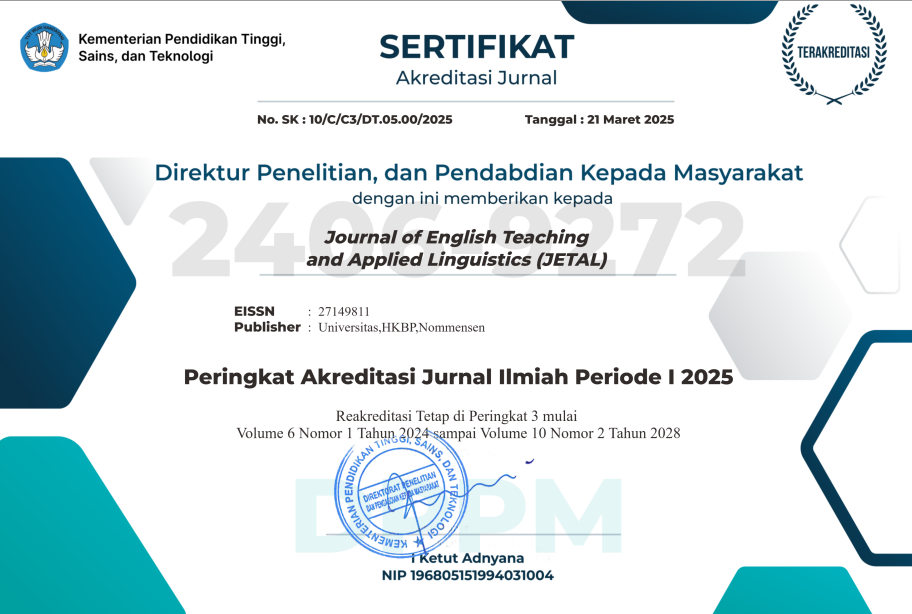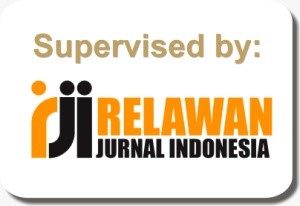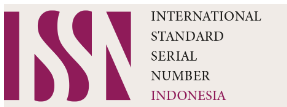An Analysis of Grammatical Errors in Thesis Abstracts and Strategies for Improvement
Abstract
This study examines grammatical errors in English-language thesis abstracts by students at an Islamic Higher Education institution in Central Java and proposes strategies for improvement. Employing a mixed-methods design, the research analyzed 50 randomly selected abstracts from seven faculties, published between 2021 and 2023, using James’ (1998) error analysis framework (grammatical, substantive, lexical, syntactic, and semantic errors) and APA 7th edition guidelines. Data collection involved quantitative error categorization and qualitative insights from surveys and interviews with students and stakeholders. Findings reveal 2,616 errors, with grammatical (24%), substantive (21%), and lexical (23%) errors being most prevalent, alongside incomplete structures in 80% of abstracts. Key causes include interlingual (L1 interference) and intralingual (English complexity) factors, compounded by inadequate guidelines and oversight. These errors undermine clarity and credibility in academic writing. The study recommends providing clear abstract writing guidelines, specialized courses, workshops, and robust evaluation systems, including grammar-checking tools and faculty-led reviews, to enhance writing quality. Implications suggest that improved training can elevate students’ scholarly communication skills and institutional academic standards. Limitations include the small sample size (50 abstracts), which may not fully represent the student population, and a sole focus on English writing. Future research should expand sampling, explore error causes qualitatively, and assess intervention effectiveness longitudinally.
References
Research for Education. Boston: Allyn and
Bacon.
Brown, H. D. (2000). Principles of Language
Learning and Teaching. New York: Longman
Burt, M and Krashen, S. (1982). Language Two.
New York: Oxford University Press
Corder, S. P. (1987). Error Analysis and
Interlanguage. Hong Kong: Oxford University Press.
Barroga, E., & Matanguihan, G. J. (2021).
Creating Logical Flow When Writing Scientific Articles. Journal of Korean medical science, 36(40), e275. https://doi.org/10.3346/jkms.2021.36.e275
Bukit, H. (2020). The error analysis in using tenses
made by students in English teaching and
learning process. JETLi: Journal of English Teaching and Linguistics, 1(2), 92-101. https://doi.org/10.55616/jetli.v1i2.21
Cava, A. M. (2011). Abstracting Science: A Corpus-
Based Approach to Research Article
Abstracts. International Journal of Language Studies (IJLS), 5(3), 75-98
Drozdová, E. (2023). How to write scholarly articles
in one English: the importance of being
consistent. ACC JOURNA Sciendo, vol. 29 no. 3, pp. 94-106. https://doi.org/10.2478/acc-2023-0017
Ellis, R. (1986). Understanding Second Language
Acquisition. Oxford: Oxford University P ress
Goldstein, C. M., Murray, E. J., Beard, J.,
Schnoes, A. M., & Wang, M. L. (2020). Science Communication in the Age of Misinformation. Annals of behavioral medicine : a publication of the Society of Behavioral Medicine, 54(12), 985–990. https://doi.org/10.1093/abm/kaaa088
Graf, Jocelyn (2008). Handbook of Biomedical
Research Writing: The Journal Article Abstract. Hanyang University: Center for Teaching and Learning English Writing Lab.
Hardi, V.A., Marleni, L., Sari, N. (2022). The
subject-verb agreement errors on students’ writing. Journal of English language and education.
https://doi.org/10.31004/jele.v7i1.183
Hipp, H., & Zoltan, P. (2005). Writing Abstract.
Writing Center: University of Adelaide.
Intemann, K. (2023). Science communication and public trust in science. Interdisciplinary Science Reviews, 48(2), 350–365. https://doi.org/10.1080/03080188.2022.2152244
James, C. (1998). Errors in Language Learning and
Use: Exploring Error Analysis. London:
Longman
Luby, S., Southern, D.L. (2022). Achieving Clarity
and Conciseness. In: The Pathway to
Publishing: A Guide to Quantitative Writing in the Health Sciences. Springer, Cham. https://doi.org/10.1007/978-3-030-98175-4_6
Musheke, M., Phiri, J. (2021) The Effects of
Effective Communication on Organizational
Performance Based on the Systems Theory. Open Journal of Business and
Management, 9, 659-671. doi: 10.4236/ojbm.2021.92034
O'Sullivan, T. A., & Jefferson, C. G. (2020). A
Review of Strategies for Enhancing Clarity and Reader Accessibility of Qualitative Research Results. American journal of pharmaceutical education, 84(1), 7124. https://doi.org/10.5688/ajpe7124
Rahyab, M. R., & Fakor, K. (2023). Familiarity
with the structure of the sentence helps us to
understand correctly. Sprin Journal of Arts, Humanities and Social Sciences, 2(12), 09–16. https://doi.org/10.55559/sjahss.v2i12.167
Silveira, E.A., Romeiro A.M.S., Noll, M. (2022)
Guide for scientific writing: how to avoid common
mistakes in a scientific article. J Hum Growth Dev. 2022; 32(3):341-352. DOI: http://doi.org/10.36311/jhgd.v32
Witchel, H. J., Thompson, G. A., Jones, C. I.,
Westling, C. E. I., Romero, J., Nicotra, A., Maag, B., & Critchley, H. D. (2020). Spelling Errors and Shouting Capitalization Lead to Additive Penalties to Trustworthiness of Online Health Information: Randomized Experiment With Laypersons. Journal of medical Internet research, 22(6), e15171. https://doi.org/10.2196/15171
Yen, T.T. (2021). Improving the competence in
using punctuation marks for english majors through reading academic texts. International Journal of Scientific and Research Publications (IJSRP) 11(12) (ISSN: 2250-3153), DOI: http://dx.doi.org/10.29322/IJSRP.11.12.2021.p12025
Zulmiyatri, Nurhastuti, & Safruddin (2019).
Penulisan Karya Ilmiah. Prenemidia Grup:
Indonesia

This work is licensed under a Creative Commons Attribution-ShareAlike 4.0 International License.
Authors retain copyright and grant the journal right of first publication with the work simultaneously licensed under a Creative Commons Attribution-ShareAlike 4.0 International License (CC BY-SA 4.0) that allows others to share the work with an acknowledgment of the work's authorship and initial publication in this journal.
Authors are able to enter into separate, additional contractual arrangements for the non-exclusive distribution of the journal's published version of the work (e.g., post it to an institutional repository or publish it in a book), with an acknowledgment of its initial publication in this journal.
Authors are permitted and encouraged to post their work online (e.g., in institutional repositories or on their website) prior to and during the submission process, as it can lead to productive exchanges, as well as earlier and greater citation of published work (See The Effect of Open Access).






